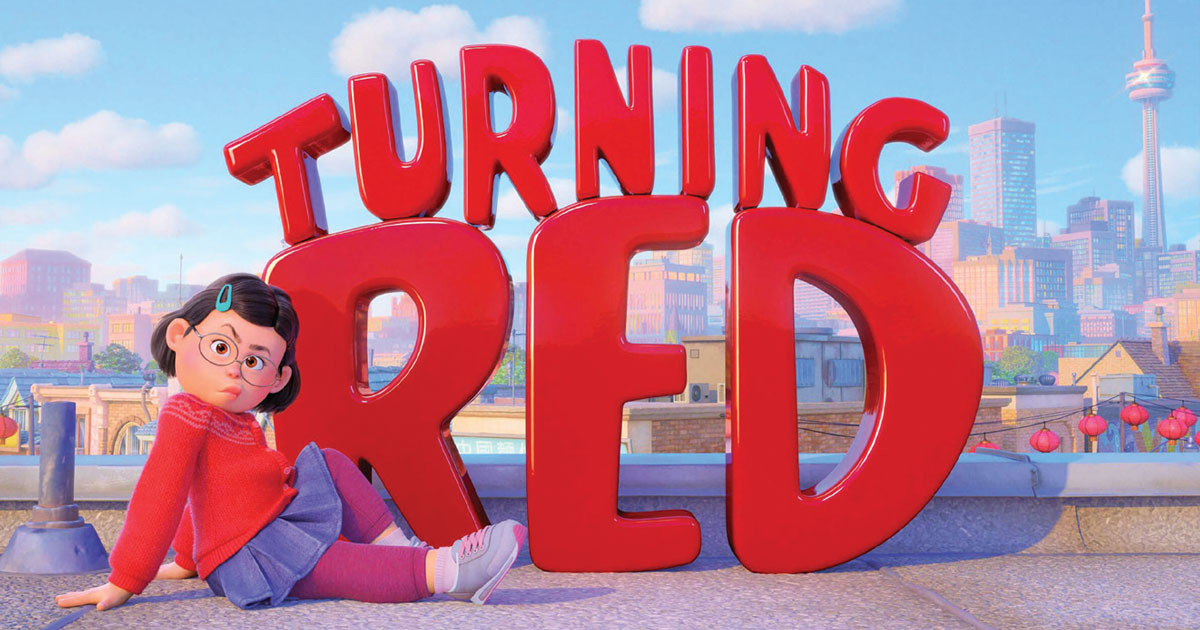Streaming on Disney+, Turning Red is a computer-animated fantasy/comedy that tells the unusual coming-of-age story of Meilin “Mei” Lee (Rosalie Chiang), a 13-year-old Chinese-Canadian living in Toronto. Mei is a typical teen who loves fashion, her friends and boy bands. When Mei wakes up one morning as a giant red panda, she is mortified, but her parents aren’t even surprised.
“Our ancestors had a mystical connection with red pandas, so this little quirk runs in our family,” her mother (Sandra Oh) matter-of-factly explains.
As it turns out, this “quirk” causes Mei to poof into a giant red panda whenever she experiences any strong emotion. She changes back into herself only after she calms down, and the sole remnant of the panda is that her hair has permanently changed from black to bright red.
Mei tries desperately to control her emotions to hide her secret and keep the panda at bay. But when the class bully teases her during dodge ball, Mei gets angry and poof, a cloud of pink smoke appears and Mei transforms into the panda. The same thing happens when Mei’s mother embarrasses her by showing up unexpectedly at school.
Mei has always tried to be a perfect, obedient daughter, but thanks to the panda, her life has become a chaotic mess. Can Mei learn to control her emotions and keep the panda in check? Or will she decide to embrace this new version of herself?
Flipping the Script
Like Mei, we all have “quirks” in our family trees. We probably don’t poof into pandas, but nearly all of us have something we wish didn’t run in our family. It could be a physical or mental illness, addiction, or dysfunctional relationships. Since no family is perfect, we all have something we wish we could change in our family trees.
We can’t change the past, but we can break negative patterns, even if they have run in our families for generations. We can make healthier choices and avoid repeating the mistakes of the past. Ending these destructive cycles depends at least partly on learning to manage our emotions.
There’s nothing inherently wrong with having strong emotions. Feeling angry isn’t a sin. Even Jesus got angry. Remember when He overturned the money changers’ tables in the temple (see Matthew 21:12-13)? Anger doesn’t have to be a destructive emotion; it’s how we handle it that determines its impact on our lives and our relationships.
If we’ve always witnessed anger handled in detrimental ways, like holding a grudge, shouting, or even physical or emotional abuse, it can be hard to find better ways to deal with it. Ephesians 4:26 says, “In your anger do not sin. Do not let the sun go down while you are still angry.” Challenges in our relationships can be like riding an emotional rollercoaster, but God will help us let go of anger and even offer forgiveness to those who’ve hurt us. Because none of us is perfect, having healthy relationships is impossible unless we learn to forgive.
God can even use our anger for good. How many non-profit organizations have been founded because somebody saw an injustice that made them angry, and they decided to do something to change it? When we get angry about a situation that breaks God’s heart, our anger is justified. If it spurs us to take action to change things, our anger was worthwhile.
God gave us our emotions when He created us. Our thoughts and feelings make us who we are. Learning to manage them in healthy ways benefits everyone we encounter throughout the day. When we show love and forgiveness to someone who we think doesn’t deserve it, it points that person to God and reminds us of the love and forgiveness He’s offered us.
Illustration: Courtesy of Walt Disney Studios Motion Pictures










Leave a Comment